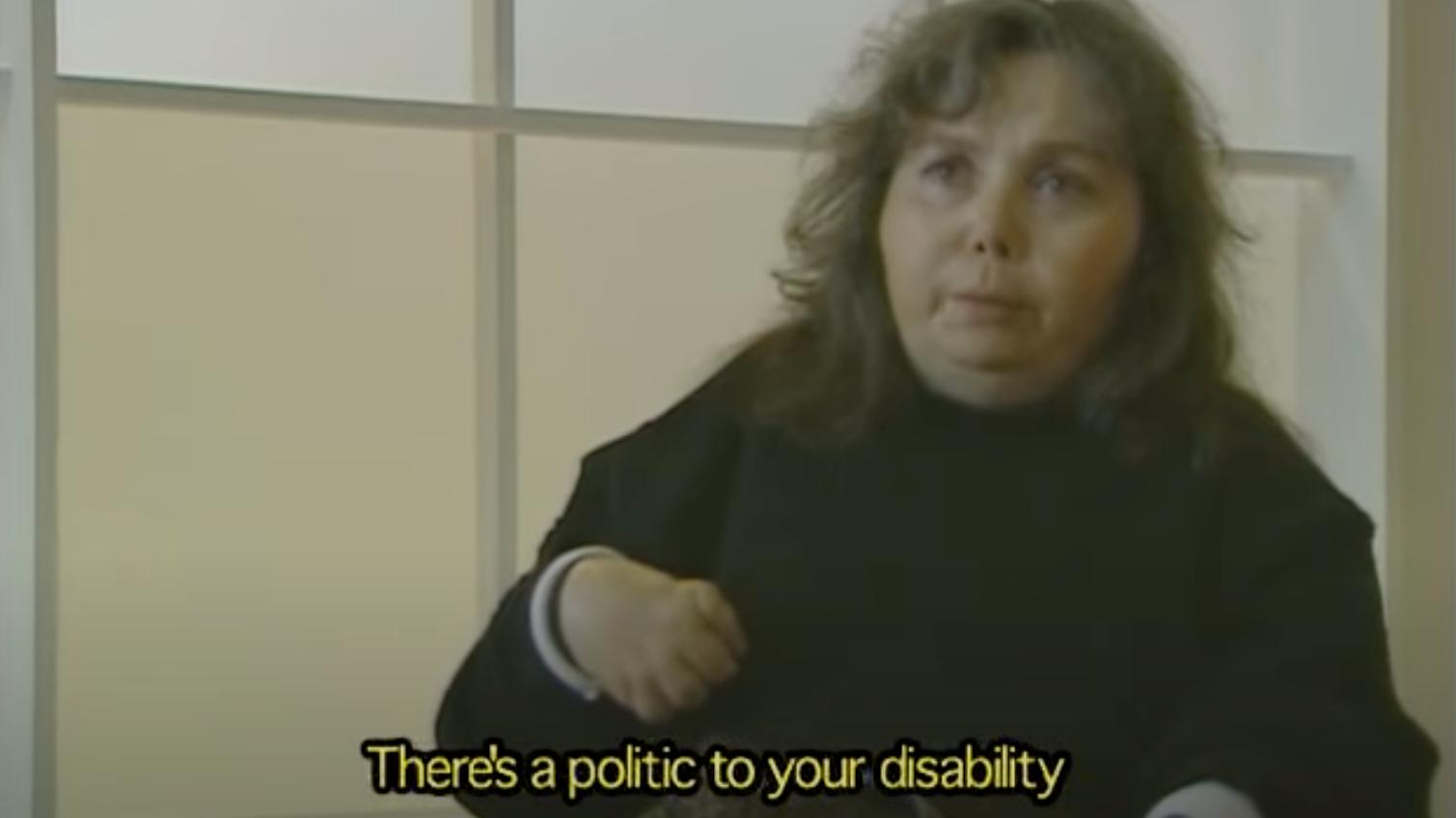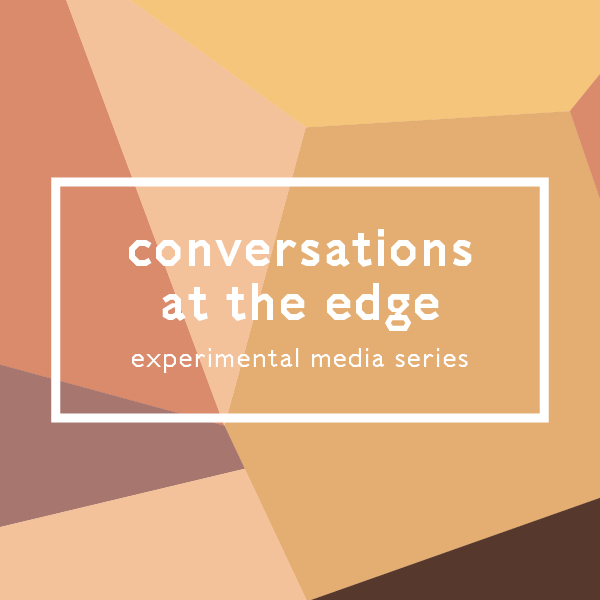
Captions can be accessed through the settings icon at the bottom right of the video window. Caption size, font, and background can also be adjusted through this menu. For this recording, we recommend that you set your captions background to "black."
A CART transcript of this event is also available here.
--
Join us for a cross-disciplinary conversation with disability activist and educator Dustin Gibson, scholar and Crip Theory (NYU Press, 2006) author Robert McRuer, and This Set of Actions is a Mirror curators Liza Sylvestre and Minh Nguyen. Using the works in This Set of Actions is a Mirror's screening programs as a jumping off point, the four will discuss art's relationship to broader disability discourse and the development of a disability justice framework that addresses the nexuses of race, class, gender, and sexuality.
Presented as part of This Set of Actions is a Mirror, multipart look at expressions of disability culture and politics in artists’ moving image.
Related programs:
Multiple artists, 1995–2018, USA and Germany, ca 72 minutes, open captions
Streaming February 22–28
Zeinabu irene Davis, 1999, USA, 95 minutes, ASL and open captions
Streaming February 25–March 3
--
Robert McRuer is professor of English at George Washington University, where he teaches disability studies, queer theory, and critical theory. He is the author, most recently, of Crip Times: Disability, Globalization, and Resistance (NYU Press, 2018), which focuses on disability art and activism in the UK and elsewhere, examining the ways in which disability is an undertheorized component of a global austerity politics. He is also the author of Crip Theory: Cultural Signs of Queerness and Disability (NYU Press, 2006), as well as numerous other books and articles. With Anna Mollow, he is co-editor of Sex and Disability (Duke University Press, 2012), and with David Bolt, the general co-editor of the six-volume series A Cultural History of Disability (Bloomsbury, 2020), which includes volumes from antiquity to the modern age.
Dustin Gibson is guided by the aspiration, legacies, and pursuit of liberation. He develops he[art]work that embodies a practice of disability justice that can live, build, support, and be implemented by marginalized communities to address the nexus between race, class, and disability. Gibson brings lived experience, scholarship, histories, art, and resources into classrooms, neighborhoods, and carceral institutions to support people in collectively imagining and building a world free from institutionalization and incarceration. He has taught various courses at middle schools, high schools, prisons, and law schools. Gibson has worked with all three Centers for Independent Living in the Pittsburgh region and has held positions with both of the national Independent Living organizations. He co-founded Disability Advocates for Rights and Transition, an organization led by disabled people that works to end the institutionalization of disabled people and support them in navigating systems to live in their communities. He is the access, disability, and language justice coordinator at PeoplesHub, a peer support trainer with Disability Link in Atlanta, and a founding member of the Harriet Tubman Collective.
Liza Sylvestre is a multimedia artist and curator of academic programs at the Krannert Art Museum. Sylvestre’s work has been shown nationally at venues including the Plains Art Museum, Weisman Art Museum, Roots & Culture, Soap Factory, Soo Visual Arts Center, and John Hansard Gallery. Sylvestre has been the recipient of numerous grants and awards including both an Artists Initiative and Arts Learning grant from the Minnesota State Arts Board, a VSA Jerome Emerging Artists Grant, a fellowship through Art(ists) on the Verge, an Art Works grant from the National Endowment for the Arts (in conjunction with Soo Visual Arts Center), and a fellowship from the Kate Neal Kinley Foundation. She has been the artist in residence of the Weisman Art Museum and the Center for Applied and Translational Sensory Science (CATSS) and in 2019 she received a Citizens Advocate Award from the Minnesota Commission of the Deaf, DeafBlind, and Hard of Hearing (MNCDHH). Sylvestre’s work has been written about in Art in America, Mousse Magazine, SciArt Magazine, and the Weisman Art Museum’s Collaboration Incubator Program site.
Minh Nguyen writes about art and organizes exhibitions and programs. Her writing has appeared in ArtAsiaPacific, Art in America, and AQNB, among others. She has organized exhibitions, screenings, and programs at the Wing Luke Museum, King Street Station, Northwest Film Forum, SOIL Gallery, and Gene Siskel Film Center, and is currently working on an exhibition at the Chicago Cultural Center.
[Image: A white woman, the poet, performer and disability rights activist Cheryl Marie Wade, is shown from the waist up. She has wispy dark hair and a black,long-sleeved top. She is in front of a light colored window that is broken up into six different panes. Her mouth is making a shape like she is talking, her gaze is focused on someone to the left of the camera and her right hand is curled and held near her chest. At the bottom of the screen are yellow captions with black borders around them that read “There’s a politic to your disability.”]

Captions can be accessed through the settings icon at the bottom right of the video window. Caption size, font, and background can also be adjusted through this menu. For this recording, we recommend that you set your captions background to "black."
A CART transcript of this event is also available here.
--
Join us for a cross-disciplinary conversation with disability activist and educator Dustin Gibson, scholar and Crip Theory (NYU Press, 2006) author Robert McRuer, and This Set of Actions is a Mirror curators Liza Sylvestre and Minh Nguyen. Using the works in This Set of Actions is a Mirror's screening programs as a jumping off point, the four will discuss art's relationship to broader disability discourse and the development of a disability justice framework that addresses the nexuses of race, class, gender, and sexuality.
Presented as part of This Set of Actions is a Mirror, multipart look at expressions of disability culture and politics in artists’ moving image.
Related programs:
Multiple artists, 1995–2018, USA and Germany, ca 72 minutes, open captions
Streaming February 22–28
Zeinabu irene Davis, 1999, USA, 95 minutes, ASL and open captions
Streaming February 25–March 3
--
Robert McRuer is professor of English at George Washington University, where he teaches disability studies, queer theory, and critical theory. He is the author, most recently, of Crip Times: Disability, Globalization, and Resistance (NYU Press, 2018), which focuses on disability art and activism in the UK and elsewhere, examining the ways in which disability is an undertheorized component of a global austerity politics. He is also the author of Crip Theory: Cultural Signs of Queerness and Disability (NYU Press, 2006), as well as numerous other books and articles. With Anna Mollow, he is co-editor of Sex and Disability (Duke University Press, 2012), and with David Bolt, the general co-editor of the six-volume series A Cultural History of Disability (Bloomsbury, 2020), which includes volumes from antiquity to the modern age.
Dustin Gibson is guided by the aspiration, legacies, and pursuit of liberation. He develops he[art]work that embodies a practice of disability justice that can live, build, support, and be implemented by marginalized communities to address the nexus between race, class, and disability. Gibson brings lived experience, scholarship, histories, art, and resources into classrooms, neighborhoods, and carceral institutions to support people in collectively imagining and building a world free from institutionalization and incarceration. He has taught various courses at middle schools, high schools, prisons, and law schools. Gibson has worked with all three Centers for Independent Living in the Pittsburgh region and has held positions with both of the national Independent Living organizations. He co-founded Disability Advocates for Rights and Transition, an organization led by disabled people that works to end the institutionalization of disabled people and support them in navigating systems to live in their communities. He is the access, disability, and language justice coordinator at PeoplesHub, a peer support trainer with Disability Link in Atlanta, and a founding member of the Harriet Tubman Collective.
Liza Sylvestre is a multimedia artist and curator of academic programs at the Krannert Art Museum. Sylvestre’s work has been shown nationally at venues including the Plains Art Museum, Weisman Art Museum, Roots & Culture, Soap Factory, Soo Visual Arts Center, and John Hansard Gallery. Sylvestre has been the recipient of numerous grants and awards including both an Artists Initiative and Arts Learning grant from the Minnesota State Arts Board, a VSA Jerome Emerging Artists Grant, a fellowship through Art(ists) on the Verge, an Art Works grant from the National Endowment for the Arts (in conjunction with Soo Visual Arts Center), and a fellowship from the Kate Neal Kinley Foundation. She has been the artist in residence of the Weisman Art Museum and the Center for Applied and Translational Sensory Science (CATSS) and in 2019 she received a Citizens Advocate Award from the Minnesota Commission of the Deaf, DeafBlind, and Hard of Hearing (MNCDHH). Sylvestre’s work has been written about in Art in America, Mousse Magazine, SciArt Magazine, and the Weisman Art Museum’s Collaboration Incubator Program site.
Minh Nguyen writes about art and organizes exhibitions and programs. Her writing has appeared in ArtAsiaPacific, Art in America, and AQNB, among others. She has organized exhibitions, screenings, and programs at the Wing Luke Museum, King Street Station, Northwest Film Forum, SOIL Gallery, and Gene Siskel Film Center, and is currently working on an exhibition at the Chicago Cultural Center.
[Image: A white woman, the poet, performer and disability rights activist Cheryl Marie Wade, is shown from the waist up. She has wispy dark hair and a black,long-sleeved top. She is in front of a light colored window that is broken up into six different panes. Her mouth is making a shape like she is talking, her gaze is focused on someone to the left of the camera and her right hand is curled and held near her chest. At the bottom of the screen are yellow captions with black borders around them that read “There’s a politic to your disability.”]
